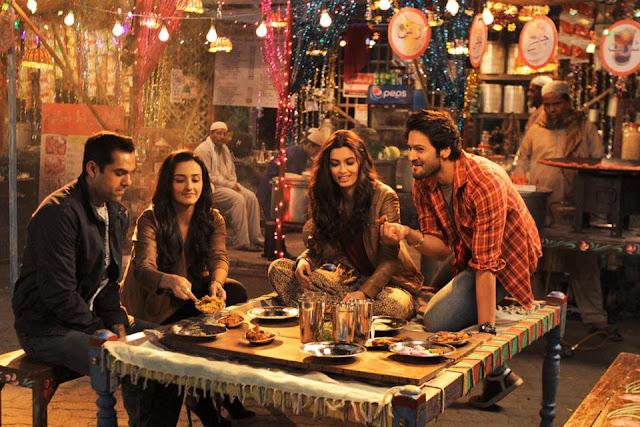by B. R. GOWANI
 (From left) Abhay Deol, Momal Sheikh, Diana Penty, and Ali Fazal in a scene from Happy Bhaag Jayegi PHOTO/SkyLarkx
(From left) Abhay Deol, Momal Sheikh, Diana Penty, and Ali Fazal in a scene from Happy Bhaag Jayegi PHOTO/SkyLarkx
After the Partition of India into India and Pakistan in 1947, the governments of the two new nations never tried hard to establish social and economic relations which could have benefited the people of both nations; instead they concentrated their energy in cold and hot wars. Whenever a little progress is achieved through interaction, it usually gets interrupted with an incident which blocks any further headway. After 69 years, the relation between the current governments is back to square one. The latest blow comes from the Indian Air Force Chief Arup Raha who, instead of talking about the atrocities in Indian held Kashmir by the Indian armed forces, has regretted that India let go 1/3rd of the Kashmir to Pakistan in 1947 – despite the fact that the dividing logic demanded that Muslim majority state of Kashmir should have gone to Pakistan.
One of the few areas where both countries interact is via the medium of entertainment. It was in 2006 that the then President General Pervez Musharraf lifted a ban on Indian films imposed in 1965 in the wake of one of the many wars fought between the two countries. (Whether ban or no ban, Indian films have always been available in Pakistan and Pakistanis love Indian films.) Now more and more Pakistani actors are working in Indian movies (for various reasons) and, due to small budgets and less films, a very few Indian actors are seen in Pakistani films. There is opposition in both film industries from some ultra nationalist elements. However, the over all atmosphere between most film members on both sides of the border is not hostile.
On August 19, 2016, Happy Bhaag Jayegi, a film written and directed by Mudassar Aziz, got released in India. Pakistan objected to several things, some genuine but others silly, and banned its release. The film is a mild comedy with enough laughs for the first half while second half loses the pace. The central female character “Happy,” played by Diana Penty, runs away from her own marriage ritual in Amritsar because she loves someone else. She escapes in a wrong truck and so ends up in a former governor’s house in Lahore, Pakistan. The distance dividing Lahore and Amritsar is about 50 kilometers or 31 miles. And thus begins a comedy.
(Penty’s acting is good. One of the reviewers has (here found Penty’s acting not at par as compared to Kareena Kapoor’s in Jab We Met and Kangana Ranaut’s in Tanu Weds Manu. Undoubtedly, both Kapoor and Ranaut acted very well in those films but Penty is not bad either in Happy Bhaag Jayegi.)
None of the objections raised by Pakistani authorities are of really serious nature. Saying that, one also has to take into consideration the delicate nature of Indo/Pak friendship or rather one should say enmity. Aziz could have avoided a lot of things. Would Indian Film Censor Board allow a release of a Pakistani film showing a Pakistani national slapping an Indian policeman or an Indian policeman saluting the photo of Pakistan’s founder Jinnah on a Pakistani currency bill? Aziz wrote a letter to Pakistani authorities expressing his displeasure over the ban. (Indian actor/producer Saif Ali Khan had done a similar thing in the past for a ban on his movie.) The problem is that film people, whether Pakistani or Indian, in a fit of anger, don’t try to see things from the perspective of the other side.
What Aziz should have done was to avoid any reference in the film which could become a reason for annoyance to the Pakistani authorities; should have tried to arrange for a premier of the film in Pakistan; and should have worked more on script. One has to acknowledge that there was no nudity, even in a dance/song, Penty’s clothes were decent. The film also had Pakistani actor Javed Sheikh, who has worked in Indian films before, and his daughter Momal Sheikh, who plays his son’s fiancee. It was a great opportunity to bring both countries a little closer but instead Aziz goofed up. More filmmakers will come up with movies dealing with cross border issues and will hopefully be more careful.
B. R. Gowani can be reached at brgowani@hotmail.com
